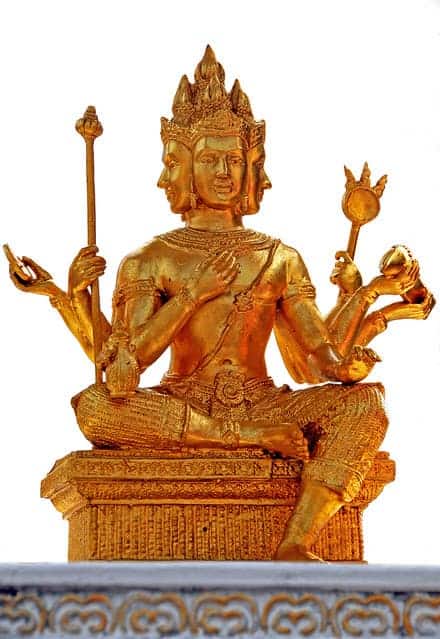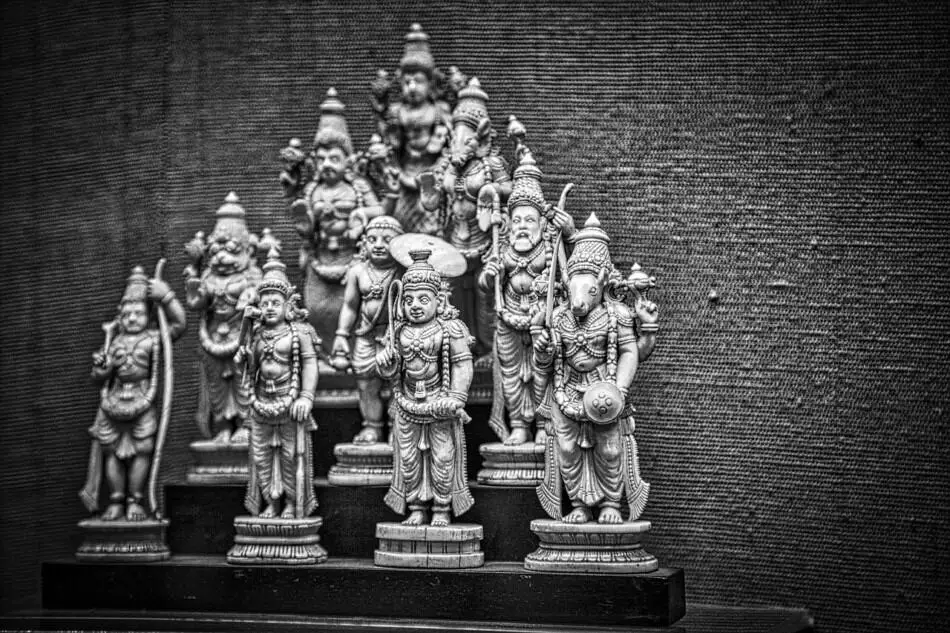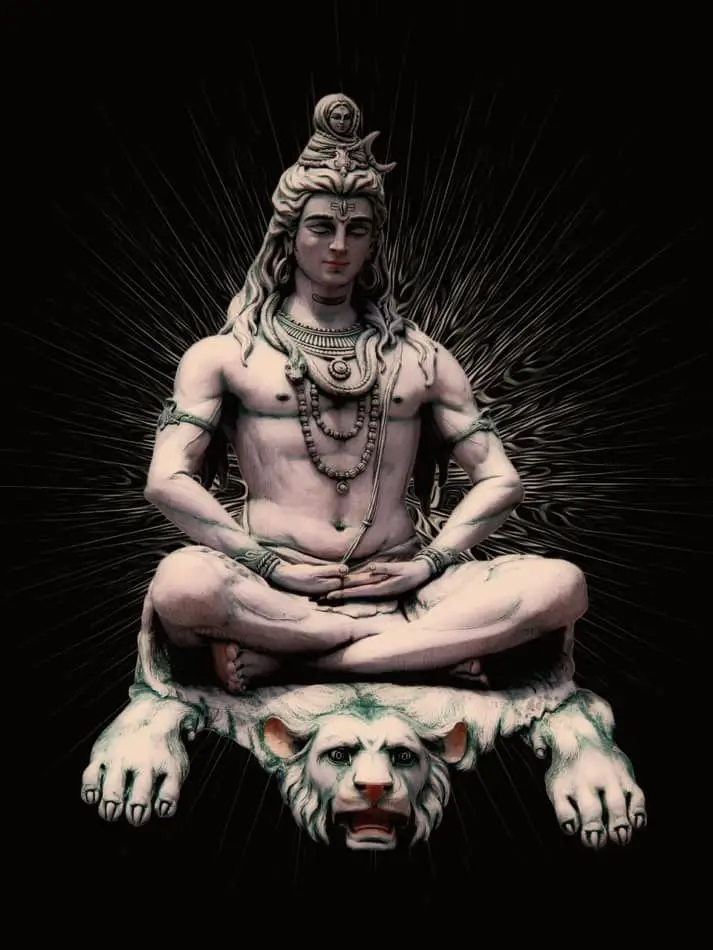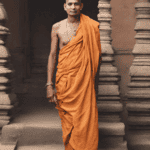Hinduism is believed to be the world’s oldest living religion. It is also known as the ‘Sanatan Dharma’. It is currently the third largest religion in the world after Christianity and Islam. Hindus worship various forms and names of one Supreme God, Brahman, who is regarded as a being with an independent existence and gives life to everything. In Hinduism, the dead body is not buried instead it is cremated. The Vedas are said to be the oldest scripture of Hinduism. Shrimad Bhagavad Gita is the main holy book of the Hindus. Like every other religion, there are some basic beliefs of Hinduism too. Today, we’ll know about some core beliefs of Hinduism.
Moksha or the final liberation of the soul is the main spiritual goal in Hinduism. People follow various ways in order to get Moksha in the end. They also believe in Karma or the law of cause and effect. They believe every God is a form of only one supreme God ‘Brahman’. They believe that life is sacred and that’s why they practice non-violence in words as well in deeds.
Origin of Hinduism
There are many different beliefs regarding the origin of Hinduism. Earlier, people believed that the basic principles of Hinduism were brought by the Aryans (Indo-European invaders) but some scholars said that the basic principles were not brought by anyone instead, the basic principles evolved within the people living in the Indus Valley around 2000 B.C.E. Some scholars say that none of the concepts are completely correct. According to them, the basic principles of Hinduism have been evolved within the people of Indus Valley but the principles were highly influenced by the outsiders too.
Hindu Beliefs About God
As mentioned earlier, Hindus worship various forms and names of one Supreme God, Brahman, who is regarded as a being with an independent existence and gives life to everything. There also exists a holy trinity or Trimurti. The trinity consists of three gods, Brahma, Vishnu and Mahesh (Lord Shiva), who are responsible for the creation, upkeep, and destruction of the world respectively. Gods in Hinduism are often represented in human or partially animal forms. The deities in Hinduism are like different paths leading to the same destination. Hindus believe devotion to God can also help an individual to attain Moksha.
Hindu Beliefs About the Caste System
The Hindu caste system is said to be more than 3,000 years old. It is a system that divides the whole society into a hierarchy according to people’s dharma (duty or occupation). The caste system includes four groups. The first group comprised of the priests and teachers who were given the name of Brahmins. The second group was called Kshatriyas, they were the warriors. The third group was of merchants and craftsmen, they were known as Vaishyas. All the people outside these three groups were put in the category of Shudras. The caste system was formed keeping in mind that the people belonging to a particular caste will follow the occupation assigned to that caste only but people no longer follow that.
Hindu Beliefs About Sacred Texts
There are a large number of sacred books in Hinduism. There are 4 Vedas, 108 Upanishads, 18 Puranas, the Bhagavad Gita and also the Ramayana. The Vedas contain a huge collection of poetic hymns of wisdom, joyful chants, prayers and sacred texts having spiritual significance. The four Vedas are – i) the Rig Veda ii) the Sama Veda iii) Yajur Veda and iv) the Atharva Veda. The Upanishads contain central concepts of Hinduism. The Puranas contain systematic recitation about the history of the universe. The Bhagavad Gita contains 700 verses in total. The Ramayana teaches us to always follow the path of righteousness. One should read holy books to understand a lot of things including the meaning and objective of life. The sacred texts cover each and every question that can arise in a person’s mind and it answers all those questions too. It teaches us to rise above all modes of nature and that we should follow our prescribed duties without thinking about anything else.
- Hindu Beliefs About Shrimad Bhagavad Gita
It teaches us the basics of Hinduism in the form of poetry taken from the epic Mahabharata. The Bhagavad Gita was revealed by Lord Krishna. He taught us how to tackle every problem of life in Gita. It is believed that the Gita contains the answer to every question. One thing on which Lord Krishna concentrated the most is to teach us that without thinking about the result we should only focus on doing our work. The Bhagavad Gita not only tells us about the essence of life but it can help us to develop our personalities as well. Many universities are following the Bhagavad Gita as their academic book. The Gita teaches us to treat everyone equally, to do good, and never expect anything in return, to never run away from our responsibilities and duties and many more things.
- Hindu Beliefs About Vedas
Vedas are a huge collection of sacred writings which comprises of chants, hymns, and mantras. Vedas not only contain spiritual knowledge but they also contain concepts about the universe, planets, and advanced mathematics. The Rig Veda contains knowledge about Ayurveda, the practice of yoga, and meditation. We all know that all these things are being practiced even today. Vedas also contain knowledge about the science of chemistry, astronomy, and surgery, etc. Vedic knowledge related to all these fields can be applied to the modern world.
Hindu Beliefs About Karma or the Laws of Cause and Effect
The Hindus strongly believe in Karma or the Laws of Clause and Effect. There is a proverb: ‘what goes around, comes around’, this proverb is perfect to define the concept of karma. The concept says that a person gets rewards for all his good deeds and punishments for all his bad deeds either during his lifetime or in the next life through reincarnation. That’s why; we should do only good deeds. We should do as much charity as we can. We should always help the needy and poor.
Hindu Beliefs About Food/Diet
According to Hinduism, food is considered as a gift of God and thus, it should be respected. Hindus should eat sattvik or pure food. It is believed that if one eats pure food he becomes pure. Killing animals for feeding ourselves is considered bad karma, so the Hindus are not supposed to eat meat or any kind of non-vegetarian food. Some Hindus don’t even involve onions, garlic and too many spices in their food. To purify the mind and body, most of the people do fasts (do not intake food for a particular period of time) as a mark of respect to their Gods. But nowadays, many Hindus have started eating non-vegetarian food.
Hindu Beliefs About Dharma or Righteousness
Hinduism is all about duty, work, protection, creation, and righteousness. In Hinduism, it is believed that we should always follow the path of righteousness and we should treat every organism equally, with love and affection. There should be no cruelty, not only towards other humans but also towards other animals and even plants. Every individual should follow the right path and live a peaceful life.
Hindu Beliefs About Death
According to Hindu texts, every person that has taken birth on this Earth will die someday. But after death, only our body dies. Our soul never dies, it only changes the body. It is immortal. No weapon can kill it, no fire can burn it, no water can drown it and no wind can dry it. After death, our body combines with the things it is made up of – earth, air, fire, water, and space. The body sleeps forever but the soul flies away. So, one should not fear death.
There are about 750 million followers of Hinduism and this number is only increasing for many years now. Hinduism believes in truth. It believes in Karma and Dharma. It believes that one cannot achieve anything without following the path of righteousness and honesty. It believes that one can attain Moksha only if he keeps doing good deeds through his life without thinking about the result or without demanding anything in exchange.
Hinduism is one of the most ancient religions that are not possibly determined for its beginning. Hindus believe that the Universe is Brahmam and the entire thing within the Universe is created by Brahman. It is accepted by all that Hinduism holds firmly the faith of Dharma, a moral and truthfulness behavior. Hindus believe everything that happens is purely based on Karma and the dharma of the individual. Even the birth of an individual is also based on the karma and Dharma propounded by the same, according to Hinduism. They follow the scriptures of their religions and taught abide by it in all aspects.
- The Veda is the sacred scriptures that lead Hindus and make the religion eternal.
- According to them, everything in the Universe is destructive and created in a cycle but not for the case of Vedas. They firmly stand in their faith that Vedas are immortal in all eras of life that is the Universe is created appropriately at the same time destroyed when time permits.
- Hindus believe that the Universe is unstable and does not retained as such but can be created and destroyed. The supreme power they believe is capable of creation, retention, and destruction of the Universe.
Practices followed in Hinduism
Hinduism preaches Hindus to follow certain rituals and principles throughout their lifetime. According to that, conducting pooja and related rituals is a must. Even today, Hindus conduct pooja twice in a day. Reciting holy books that preach moral values, chanting mantra and slogan, Jepam, observing festivals, visiting pilgrimages occasionally, above all following dharma committing no mistakes to others are some of the practices Hindus follow without fail.
According to them, birth is the result of karma and for the case of denying birth again, they do not trespass their limits. The limits are taught at the childhood stage and preached to follow throughout their life. For the cause, they seek holy books that cite the importance of practicing rituals in Hinduism.
Observing festivals is strictly followed in Hinduism and even a single day formal festival is not missed by them. The perfect means of observance is carried in every festival that makes their life meaningful and even they believe so. Conducting pooja is carried out twice a day at Dawn and at Dusk is bring the positive and optimistic vibration throughout the house and the mind of residents. Jepam is murmuring the names of almighty sitting aside that brings a refreshing energy and feel into the soul.
While chanting mantra and slogan are carried out in front of a holy fire pit or the yagna kunda at the time of Homa are an additional but important practice followed in Hinduism. This specific practice is not followed by all but the special category people ‘’Brahmins’’ are intend to carried out Yagna and these are carried out on special occasions like house warming, initiation of new business, beginning of construction, etc.
These practices are preached and taught to the Hindus to follow, strictly. Sometimes, religious Gurus do the work among Hindus and they arise rarely on a time basis. Aadi Shankara, Ramakrishna Paramahamsa, Swamy Vivekananda, etc are some notable preachers who did their esteemed service in preaching and teaching Hinduism.
Tools for worship
Exactly, it is very important to mention what are the worship factor and the tool used in Hinduism? Also, it is indigenous to mention about the worshiping tool and the factor-driven to ‘’Moksha’’.
God is an indispensable tool or the medium that acts as superpowers over the life of individuals and drive their soul towards Mukthi. Hinduism is polytheistic recommending plenty of supreme powers to worship.
The pantheistic belief is been extended in Hinduism. Thus, an enormous number of God/Goddess is worshipped by Hindus. They believe in the trinity of supreme powers is the primary and actual functioning powers of the Universe. Trinity of supreme powers is Brahman, Vishnu, and Shiva that carries out the act of creation, preservation, and destruction respectively.
Brahma

He is the God of creation known to create the world right beginning to the single sense grass till the six senses Human being. He is responsible for all the happening related to karma which thereby leads to the birth of every living thing on this earth. Despite his creational work, he is not subjected to worship by living beings or Hindus because of lied about finding the divine power of light.
Vishnu

The God of preserving or protecting the Universe or the entire world is Vishnu. He protected the myths and glory of Hinduism by means of his incarnation. He incarnated every occasion where there occurs the destruction of Dharma. Probably, His incarnation is related to the evolution of the Universe and coincides with Darwin’s theory of evolution. Some of His incarnations include Rama and Krishna that revealed the ethnicity of Human beings and their establishment.
Shiva

The supreme power responsible for the destruction of sin and immoral is Lord Shiva. He is also responsible for the complete destruction of the era that we call ‘’Yugam’’ in Hinduism. Hindus believed that He drunk in the sin of human being that is the reason for the bluish-colored throat indicating the poisonous attitude of living being.
Besides the trinity powers of Gods, Hindus also praise the God of obstacles ‘’Ganapathy’’. They initiate every act after uttering the name of ‘Ganapathy’ and believed the assurance of prosperity. Similar to Ganapathy, other known Gods/Goddess is being worshiped for specific reasons. Just because of polytheistic habit, Hinduism Spotify various God/ Goddess for various occasions. Saraswati, Goddess of education, Laxmi Devi a female God responsible for prosperity, Parvathi Devi stands for well being and strength of Humans. Beginning with Lord Indra, there are eight defining Gods stand for every direction and its sub-direction.
Hindus perform ritual pooja and related customs to praise individual God on specific occasions on the auspicious day called festival. They also framed an interesting and unique method of observing the festival every season. They do not simply frame the method but it also related to the constellation and solstice of Space.
Re-incarnation
According to Hinduism, Re-incarnation is inevitable and every Human being prone to have born every time when the soul leaves the mortal body. They believe that re-incarnation includes other living things like birds, animals, and insects too. Hindus are taught not to go against dharma and earn karma that may lead to re-birth eventually. Obviously, it is a cycle of creation, preservation, and destruction that occurs every period of time among individuals and the cycle of reincarnation is called ‘’Samsara’’.
It is stressed to remember that one living thing harming the other on this earth is prone to revenge by the harmed one by itself. It is also insisted that the harmed living thing, that it can be a bug, could have been the great ancestor or the future grandchildren of the harming person. The saying adds that those riches belong to the current birth could not be carried to the next birth even it is owned by the individual himself or herself.
According to Hindu mythology, Maya is the intellectual magic or the illusion felt around the Universe. The phenomenon of one thing is interchangeable between two illusions and it is believed yet to be so, that is Maya. Advaita, a school of Vedanta denotes the fundamental concept of Universe constraint within the word Maya. Hinduism believes that God makes the effort of illusion reflected by Maya and He is responsible for whatever held, felt and occurred on this earth. Simply, Maya is an act of illusion desperately about particular things for its sustainity even though it is not.
This Maya is the specialty of Hinduism to demolish the ignorance or ‘’agnanam’’ in the human mind and develop and feel the existence of God a supernatural power. However, the stage of acceptance that God is the supernatural power being existed amongst living things on the Universe is the final stage of Moksha or Mukthi. The term is fully-fledged established in Hindu mythology in a better manner rather else things in the world.
Sacred texts
It is eventually the Holy Scriptures that led the fellow beings to lead a happy and fulfilled life. According to Hinduism, sacred texts are aged very old and calculated to be existing around 1200 BCE and 100 CE. The Vedas are the four major classifications like Rig, Yajur, Sama, and the final but not least the Adharvana Veda.
Along with other sacred texts like Vedas, Great epics Ramayana and Mahabharata are included in the lists. Moreover, Bhagavatar Gita that illustrates the spiritual smrithi- remembered and the Shruthi – heard along with realm followed every era. Lord Krishna preaches the Gnanam that ought to be stood without hesitation by his fellow beings.
Code of behavior
There is a differing group of Yama and Niyama are stated in the final part of Vedas called ‘’Upanishads’’. These are ten unique types of behavioral code illustrated by Hinduism that are required to be followed by the Hindus. These codes of conduct are the ultimate behavior that led humanity towards knowledge, the sanctum of God very close to Moksha. Brahmins are the route of preaching the code of behavior to the Hindus and the later will abide by it throughout their life.
